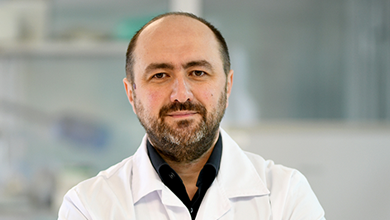
ასოცირებული პროფესორი, სამედიცინო ბიოლოგიური კვლევების მიმართულებით
ივანე აბიათარმა 2003 წელს თბილისში დაასრულა სამედიცინო განათლება, რის შემდეგაც სწავლა განაგრძო ჰაიდელბერგის უნივერსიტეტის ევროპის პანკრეასის ცენტრის (გერმანია) სადოქტორო საფეხურზე. 2007 წლიდან დოქტორანტურაში, ისევე როგორც კლინიკური რეზიდენტურაში, სწავლა განაგრძო მიუნხენის ტექნიკური უნივერსიტეტის ქირურგიულ კლინიკაში (გერმანია). 2010 წელს დაიცვა სადოქტორო დისერტაცია თემაზე: „პანკრეასის კიბოს პერინერვული ინვაზიის თავისებურებანი“ ივ. ჯავახიშვილის სახელობის თბილისის სახელმწიფო უნივერსიტეტისა და მიუნხენის ტექნიკური უნივერსიტეტის ერთობლივი სადოქტორო პროგრამის ფარგლებში. 2011 წელს მოიპოვა ზოგადი ქირურგის კვალიფიკაცია. 2007-2013 წლებში მუშაობდა მიუნხენის ტექნიკური უნივერსიტეტის კლინიკაში „რეხტს დერ იზარი“ პოსტდოკისა და მოწვეული ექიმის პოზიციაზე.
2013 წლიდან ივანე აბიათარი ილიას სახელმწიფო უნივერსიტეტის ასოცირებული პროფესორია. 2018 წლიდან ხელმძღვანელობს მედიცინისა და საზოგადოებრივი ჯანმრთელობის კვლევით ინსტიტუტს, ხოლო 2020 წლიდან დაინიშნა ილიაუნის მედიცინის სკოლის ხელმძღვანელის თანამდებობაზე. ივანე აბიათარის ხელმძღვანელობით უნივერსიტეტში ფუნქციონირებს დიპლომირებული მედიკოსის ინგლისურენოვანი საგანმანათლებლო პროგრამა და მედიცინის ინგლისურენოვანი სადოქტორო პროგრამა.
ივანე აბიათარი სამედიცინო განათლების სპეციალისტის სერტიფიკატის მფლობელია (AMEE). 2006-2010 წლებში მას მიღებული აქვს „ბორინგერ ინგელჰაიმის“, DAAD-ისა და „ფრიც ტისენის“ კვლევითი სტიპენდიები. 2017 წელს გახდა საქართველოს საუკეთესო ახალგაზრდა მეცნიერი. 2017-2019 წლებში იყო GIZ/CIM პროგრამის ბენეფიციარი. 2022 წელს ივანე აბიათარმა მოიპოვა ფულბრაიტის სტიპენდია მკვლევართათვის (ჰარვარდის სამედიცინო სკოლა, ბოსტონი, აშშ).
გამოქვეყნებული აქვს 30-ზე მეტი ნაშრომი რეფერირებად ჟურნალებში.
h-ინდექსი = 12 (SCOPUS).
პუბლიკაციები
წიგნის თავები
ბიო-სამედიცინო კვლევა I (ENG); სამედიცინო სწავლება; ტრანსლაციური მედიცინა
პრეკლინიკური და კლინიკური კვლევა
2020-2021 წელი
სადოქტორო საფეხური
2018-2019 წელი
საბაკალავრო საფეხური
სადოქტორო საფეხური
2017-2018 წელი
საბაკალავრო საფეხური
სადოქტორო საფეხური
2016-2017 წელი
საბაკალავრო საფეხური
სადოქტორო საფეხური
2015-2016 წელი
საბაკალავრო საფეხური
სადოქტორო საფეხური
2014-2015 წელი
საბაკალავრო საფეხური
სადოქტორო საფეხური
2013-2014 წელი
სადოქტორო საფეხური